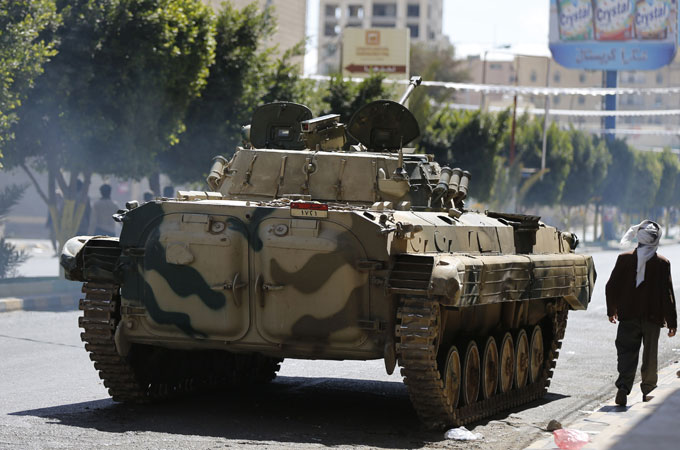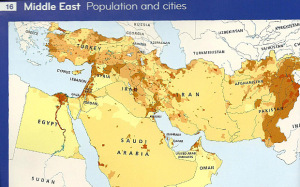By Kathryn Maureen Ryan
Impunity Watch, Managing Editor
SANAA, Yemen – Houthi fighters reportedly entered Yemen’s presidential palace after a brief clash with the presidential compound’s security guards, witnesses and security sources said. The attack comes a day after some of the worst fighting reported in the capital in several years. Guards at the presidential compound, which houses the main office of President Abd-Rabbu Mansour Hadi, said they handed over the compound to Houthi fighters after a brief clash.

Before the fighters stormed the Presidential compound A tense calm seemed the be holding in Sanaa as Houthi rebels continued to surround the prime minister’s residence as well as the presidential palace, despite the fighters and the government reaching a ceasefire after a day of violence on Monday. As of Monday evening, nine people have been killed and at least 90 wounded in the fighting.
After Monday’s fighting a heavy presence of Houthi fighters was seen throughout Sanaa on Tuesday, as the rebels fortified their positions in the capital, which they seized after fighting in September last year.
Before the taking of the Presidential compound Al Jazeera’s Omar Al Saleh, reporting from Yemen, said the situation in the City was “tense but calm”. He said “A meeting is supposed to take place between all political players; President Abd Rabbu Mansour Hadi, Prime Minister Bahah and representatives of the Houthis, but it remains unclear if these talks have started.” “We’re all waiting to hear from this meeting,” he said, adding that the United Nations Security Council was scheduled to discuss the situation in Yemen in a closed session on Tuesday.
President Hadi and the Houthis fighters in Yemen accuse each other of failing to implement a United Nations brokered peace agreement calling for Hadi to form a new national unity government and reform government agencies and for the Houthis to withdraw their fighters from Yemen’s cities. The Houthis have also demanded integration of their militiamen into Yemen’s security forces which are dominated by Hadi. The ongoing power struggle between the Hadi and the Houthis has undermined Yemen’s ability to fight al-Qaeda’s Yemeni affiliate, al-Qaeda in the Arabian Peninsula.
United Nations Secretary-General Ban Ki-moon has condemned the recent fighting in Yemen, on January 7, his office released a statement condemning in the strongest terms an attack against a policy academy in Yemen’s capital which killed at leaste 37 people. A statement issued by his office said he “expresses his condolences to the victims’ families and wishes a swift recover to all those wounded.” The Statement also said, “The Secretary-General reiterates his previous calls to all Yemenis to work together and to fight terrorism and to bring security and stability to Yemen.”
The United Nations High Commissioner for Human Rights Zeid Ra’ad Al Hussein called on the international community to pay greater attention to the ongoing violence in Yemmen. “Perhaps because of the violence engulfing so many other countries – relatively little attention is being paid to the situation in Yemen,” He said. “The past few weeks have seen dozens of people killed in a succession of bomb attacks in Yemen. Such wanton acts of indiscriminate violence are utterly deplorable.”
For more information please see:
Al Jazeera – Yemen’s Sanaa Tense But Calm As Truce Holds – 20 January 2015
Reuters – Houthis Take Yemen Presidential Palace-Witnesses, Sources – 20 January 2015
United Nations News Centre – UN Rights Chief Urges More Global Attention to ‘Wanton’ Violence in Yemen – 9 January 2015
United Nations News Centre – Yemen: Ban Condemns Deadly Attack on Police Academy, Calls for Accountability – 20 January 2015


